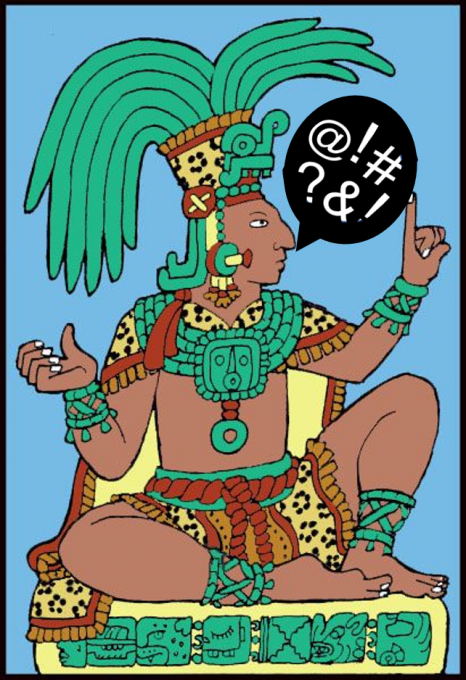Vulgar expressions, insults, and bad words.
I begin this column by thanking everyone for the hundreds of messages received via email, Facebook, and Twitter. I promise to read them all and respond to each one and incorporate the words that are kindly sent or suggested to me. After the past five columns, time and time again, I have been asked insistently to dedicate a chapter to the vulgar expressions, insults, and bad words we use in our Yucatan Peninsula. In this installment, I will try to do so in the most respectful way possible.
Our Yucatecan lexicon can be excessively elaborate and extravagant. Hence, our expressions are pretty flamboyant, and we have terms for almost every emotion, and more often than we would like to admit, we use them.
In Yucatán, we have a peculiar way of using cuss words. However, these insults are not necessarily synonymous with denigrating our interlocutor. While there are phrases that are usually offensive in the rest of Mexico, in our state, they are not necessarily so, depending on the tone of voice with which they are used. Many of them are not even considered offenses among us, but rather responses of astonishment, discomfort, and even disbelief before an event that caused enormous surprise. Hence, one of the main phrases used in Yucatan to denote the above-mentioned is “tu culo” -your ass-.
The expression “tu culo” -your ass- is perhaps one of the most used by Yucatecans in practically every situation, as we will see in the following examples:
Surprise.
Did you hear that Doña Mari passed away?
No, no, tu culo… I just saw her yesterday.
Anger
Hey! That’s not what we agreed on.
Tu culo… (Your ass) we didn’t agree on anything.
Joke/Joy
Happy birthday you made it to 50… but you look a hundred!
Tu culo.
This expression is also used with the Mayan words “pirix” and “xix,” leaving the phrase as: “tu pirix con xix.” But… what does this expression mean? Pirix means “butthole,” and also the genital area “Xix” means remains, remnant or residue, that is, the excess of something. Therefore, it is easy to imagine the literal translation of this expression, although its meaning is the one explained above.
Perhaps one of the words with the most synonyms in the Spanish language is the male reproductive organ, known by its thousand meanings. Its countless ways of naming it allow establishing a linguistic atlas throughout the length and breadth of our world. Yucatan is no exception, and the virile member has a name. That name is “keep” (many pronounce it keb). In addition, it can be “chichaan” (pronounced chinchán) which means small, or “nohoch” (pronounced nojoch), which means big.
One of the words most used by Yucatecans of yesteryear (and today) came to the Yucatan Peninsula with the Spaniards. In Veracruz, as in Cuba, it continues to be widely used in everyday language. However, although its meaning has not mutated, for us, its use has a different intention. In Yucatán, its use denotes frustration and anger rather than its real meaning. The word in question is: “Coño.”
According to the “Dictionary of Word Origins,” the word alludes to the Latin “cunis,” whose real meaning is rabbit. In reference to the fertility of this animal, the word historically degenerated to “cunnus,” which means vulva, and always, even in Latin, was considered obscene and vulgar. From this word, many others are derived, all with sexual connotations.
-Last one for the road-
Of all the insults or expletives that can exist in our “yucatequismos,” the mother of all bad words has to be, without a doubt, “pelaná.”
“Pelaná” is the conjunction of a series of words from the Mayan language, which are:
– The possessive “u” as a third-person singular possessive adjective equivalent to “his or hers.”
– The word “peel,” whose literal meaning is the vagina.
– The word “na’, which means mother/mom.
Hence the Mayan speaker would say the expression as follows: “u-peel-a-na’.” If we do a literal translation, respecting the syntactic composition, it would be the equivalent of saying in Spanish “su vagina de tu madre.” -Your mothers’ “c**t”-
In Yucatecan Spanish, we use the word in both the first and second person singular. However, when we change the word to name several people, we use the ending -es- found in plural nouns and adjectives. Hence, the plural of pelaná is a hybrid of Mayan and Spanish, leaving the word as “pelanaes” for those who are not naturally Mayan-speaking, since the term does have a perfect plural in the Mayan language, which is the ending “o’ob.”
But, let’s go back to the word “pelaná.” We already know its literal translation, but what is its use? We can say that, in our little piece of paradise, its usage is universal. A pelaná is a bad person, a despicable human being, someone you dislike… but it can also be your best friend or your sister or brother, the word you shout when you are frustrated or when you are in pain after “mashing” a finger. Likewise, a pelaná is the person who took your parking space, your place in line, or drank the last cold beer from the fridge.
See you next week.
José E. Urioste Palomeque
For Times Media Mexico / The Yucatan Times
November 30, 2021
Merida Yucatan, Mexico.
Facebook: @JoseUriosteMx
Twitter: @JoseUrioste_
Email: [email protected]


